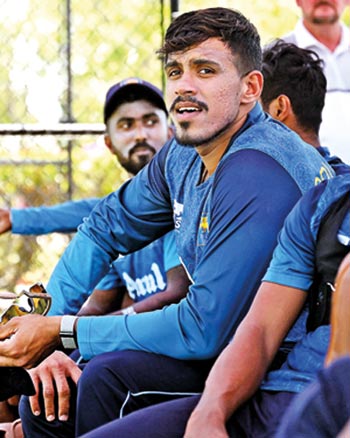Was it really ‘blown out of proportion?’

Maheesh Theekshana during a training session
Sri Lanka has been grappling with logistical challenges that have adversely affected the team’s performance in the ongoing World Cup in the USA and the West Indies. Players have highlighted that they are one of only two teams among the 20 competing to endure a gruelling schedule in their quest to qualify for the Super Eight round, which now seems impossible following Saturday’s loss to Bangladesh–their second.
According to media reports, on the day Sri Lanka played South Africa, the team had an early start, waking up at 5:30am, leaving the hotel at 6:30am, travelling an hour and a half to the ground. They had breakfast upon arrival. That same afternoon, they drove back to the city, packed, checked out, and prepared for a 6:00pm flight. In contrast, South Africa, having been in New York for a week, travelled just 14 minutes to the ground and remained in the same location for two matches.
Sri Lanka and the Netherlands are the only teams playing their first-round matches across four different venues. This stark contrast is evident when compared with teams like India and South Africa, who benefit from playing multiple matches at the same venue and having nearby accommodation. The disparity is particularly pronounced during Sri Lanka’s matches in New York, where their hotel complicates early-morning starts.
The frustration within the Sri Lankan camp is palpable. Players like Maheesh Theekshana have articulated a sense of unfairness, citing prolonged airport wait times and gruelling travel schedules as evidence of the inequity compared to other teams. These logistical nightmares take a toll on the players’ physical and mental fortitude, which are crucial in international cricket.
The cricketers’ grievances highlight a lack of foresight and advocacy from Sri Lanka Cricket’s management during the scheduling process, pointing to a blatant disregard for the players’ well-being and competitive edge.
“So unfair for us, we have to leave every day [after the match] because we are playing [at] four different venues,” Theekshana was quoted as saying by cricbuzz.com, after the defeat to South Africa.
“The flight we took from Florida, from Miami, we had to wait like eight hours in the airport to get the flight. We were supposed to leave at 8:00pm but we got the flight at 5:00am. It’s really unfair for us, but it doesn’t matter when you play [on the field].”
“I can’t say the names of the teams that have got the opportunity to stay in the same place but their hotel is only 14 minutes to the ground. Ours was like one hour and 40 minutes. Even today [match day], we had to wake up around 5:00am to come here,” Theekshana added.
He also noted that playing each game at different venues prevents Sri Lanka from quickly assessing conditions. Their game against South Africa was the first of the World Cup in New York, where they opted to bat first and were bowled out for 77 in a 6-wicket defeat.
While some may dismiss their complaints as entitlement, it is crucial to understand them within the fiercely competitive environment where every advantage can tilt the scales in favour of victory. Theekshana’s remarks highlight the need for introspection and greater equity in tournament logistics across all participating teams.
The scheduling disparities were evident from the warm-up matches. Sri Lanka played their warm-up games in Florida before travelling to New York for their opening match against South Africa–that too after an eight-hour delayed flight. They will only return to Florida for their third match. In contrast, teams like Canada, India, Nepal, and the USA had the advantage of playing warm-up matches and starting their tournaments in the same location.
Sri Lanka Cricket, having approved the schedule, dismissed these issues as a ‘minor hitch’ blown out of proportion by local politicians. Following Theekshana’s comments, Opposition leader Sajith Premadasa raised the issue in parliament, demanding an explanation from Sports Minister Harin Fernando, currently in the USA.
“There were two minor issues which we have taken up very strongly with the ICC,” said Ashely de Silva. “There was very little we—SLC or the ICC—could do regarding the flight delay. The team was flying on a chartered flight, and there had been a long delay. The other issue is the distance from the hotel to the ground. When we inquired, we were told it’s about 30-40 minutes away, but due to traffic, it has taken more time.”
“Apart from that, I think there’s no issue. There’s enough recovery time in between for the players,” he explained, adding that the situation has been blown out of proportion by politicians.
Asked why SLC did not raise objections to these logistical issues during the scheduling deliberations, de Silva said they had discussed all matters and saw no problem with it.
“Apart from India, all the other teams are in a similar footing. I don’t see why the fuss here,” he added.
Bangladesh and the Netherlands played their warm-up matches at their tournament venues. Some teams either skipped warm-ups or travelled within the Caribbean.
In the opening round, India, New Zealand, and South Africa have an advantageous schedule, with three consecutive matches at one venue. On the other hand, Sri Lanka and the Netherlands have to travel extensively for each match. England, Ireland, Namibia, Oman, and PNG only move between two venues, making their logistics much smoother.
In Parliament on Friday, Sports Minister Harin Fernando said that the Sports Ministry will conduct a probe into the failure to resolve the issues faced by the Sri Lankan cricket team in the ongoing ICC Men’s Cricket World Cup in the USA.


